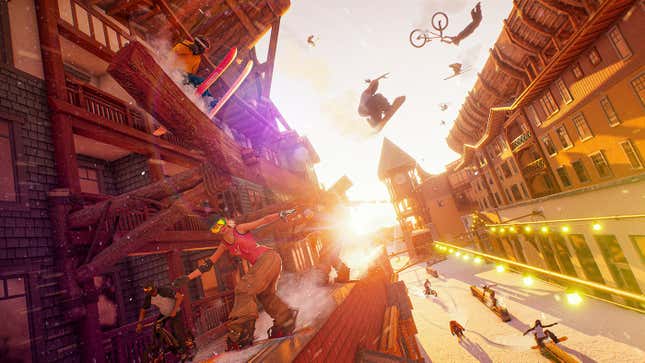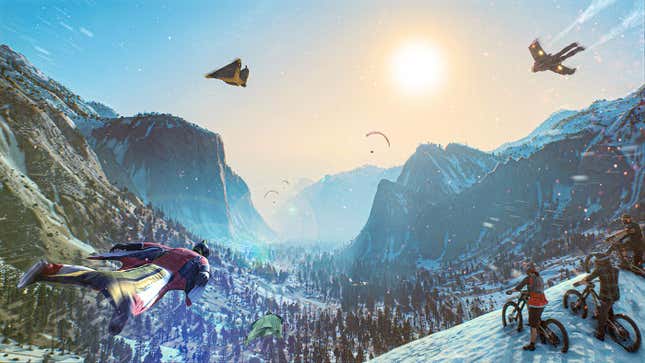
I was extremely excited to play Riders Republic, an upcoming action sports game about defying gravity in the American backcountry. Then I played the beta. I am no longer excited to play Riders Republic.
Over the weekend, Ubisoft, a France-based publisher that’s been the subject of well-documented reports of endemic workplace abuses, held an open beta for Riders Republic. Players had four days to test out the game’s playable disciplines: biking, skiing, snowboarding, wingsuiting, and rocket-wingsuiting. Based on some time with the beta, man, Riders Republic doesn’t get it at all. It certainly doesn’t square up to the studio’s previous release, 2016’s Steep, which totally nailed the vibe of bohemian sports like freeskiing and snowboarding.
Riders Republic is—brace yourself for some serious word vom—a “massively online social playground,” as the devs at Ubisoft Annecy bill it. You and up to 49 other players are dropped on an open world inspired by real-world landmarks: places like Yosemite, Grand Teton, and Mammoth, the holy site of snowsports. You can race. You can compete in points contests. You can, at least on paper, explore the map of your own volition.
All of this sounds right, sounds like Riders Republic thoroughly grasps and conveys the meditative joy of action sports. And given the studio’s pedigree for this sort of thing, what with how awesome Steep was, you’d not be wrong to get your hopes up. Unfortunately, Riders Republic whiffs right out of the gate.
From the starting gun, Riders Republic is a relentless barrage. You’re constantly whisked from one race to the next. You unlock new equipment with every completed event—stuff that dictates how fast you are or how good you are at performing tricks, as if equipment is truly determinative of skill. The screen is a flurry of notifications, screen names, objectives, destination markers, and other stress-inducing clutter. All the while, every NPC blathers on about how sick and gnarly and totally radical everything is, and how you’re practically destined to become the gold-medal multihyphenate for all of the game’s badass included sports. (Yes, Riders Republic is the mid-’90s ideal of action sports personified.)
It is ceaseless.
There’s also the matter that you’re railroaded into biking from the start. No slight meant to bikers, you do you. Personally, my interest in Riders Republic was rooted solely in that it would allow me to vicariously ski and snowboard, two sports I enjoyed while growing up but haven’t been able to spend much time doing the past few years. (See: pandemic, covid-19. See also: city, living in one.) The beta forces you to play through a bunch of biking-only events before even giving you the option to switch to snowsports. And even then, the whole point of the game is to become The Very Best, Like No One Ever Was, at every playable sport, so it stands to reason the full game will at some point force you right back into a discipline as patently ridiculous as rocket-wingsuiting.

Contrast that with Steep, in that you never really needed to participate in sports you weren’t interested in. Rather, progression was tied to how you played, like how well you performed at contests or races, with certain events requiring you to commit to a specific sport. But you could generally choose what you wanted to do and do it when you wanted to do it. You could even earn progression for just...aimlessly exploring.
And this is to say nothing of how badly the game writes off realism. To whit: While skiing, you can, at any pitch and traveling at any speed, knock out a Misty 540—a high-level trick in which you perform a forward flip at the same time as one-and-a-half horizontal spins—on flat ground. It’s possible in real life to perform a flat-ground Misty 5, but you’d typically need some sort of lift: a small booter, a mogul, or at the very least a knuckle to give you some pop. And if you’re going to do it on flat ground, you better have some velocity behind you. Steep made it so stomping that trick, and others like it, was a genuine challenge.
That’s generally where Riders Republic breaks from Steep, which featured a Skate-like commitment to realism. If not an exact facsimile of Newtonian physics, at least both Steep and Skate tried to replicate the often bone-breaking process of practice. Riders Republic plays more like SSX: prioritizing the sheer spectacle of Number Go Up over the meditative calm of trying the same move again and again and again until, through sheer force of will, you finally get it down.
By and large, Riders Republic seems to have fallen directly in the “more more more!” that afflicts so many live-service games these days, all while writing off the core ethos of action sports. In short, action sports are largely exercises in free expression. Riders Republic is nothing more than a hall monitor.
Given the proliferation of such disciplines as skiing and snowboarding at, say, the Olympics, there’s more money—and thus more pressure—than ever funneled into what once used to be the realm of counter culture. But for every kid who trains eight hours a day to podium at the X Games, there are a dozen more who just want to hone their own craft, who just want to nail down a cool trick for Twitter or TikTok, or, screw it, who just want to kick back with their friends without the nerve-wracking forces of a competitive scene killing the vibes. Steep fully understood that. Riders Republic, and this is evident from even dipping my toes in, does not.
Of course, the game could indeed buck my revised expectations when it comes out in full for PlayStation, Xbox, and PC on October 28. From the main menu, there’s a “Zen Mode” that sounds exactly like the sort of thing I was eagerly anticipating. Short version: It allows you to putz around the game’s world without an internet connection.
Zen Mode was deactivated for the beta, so I didn’t get a chance to try it, but I’ve couched my hopes, seeing as the developers even seem to consider the mode an afterthought.
“[Zen Mode] is riding and enjoying the playground for yourself, and that is a very specific experience,” Riders Republic creative director Igor Manceau told The Gamer. “That said, to really grasp what the game is all about, you have to play connected. We think the social experiences are what makes it so special.”




